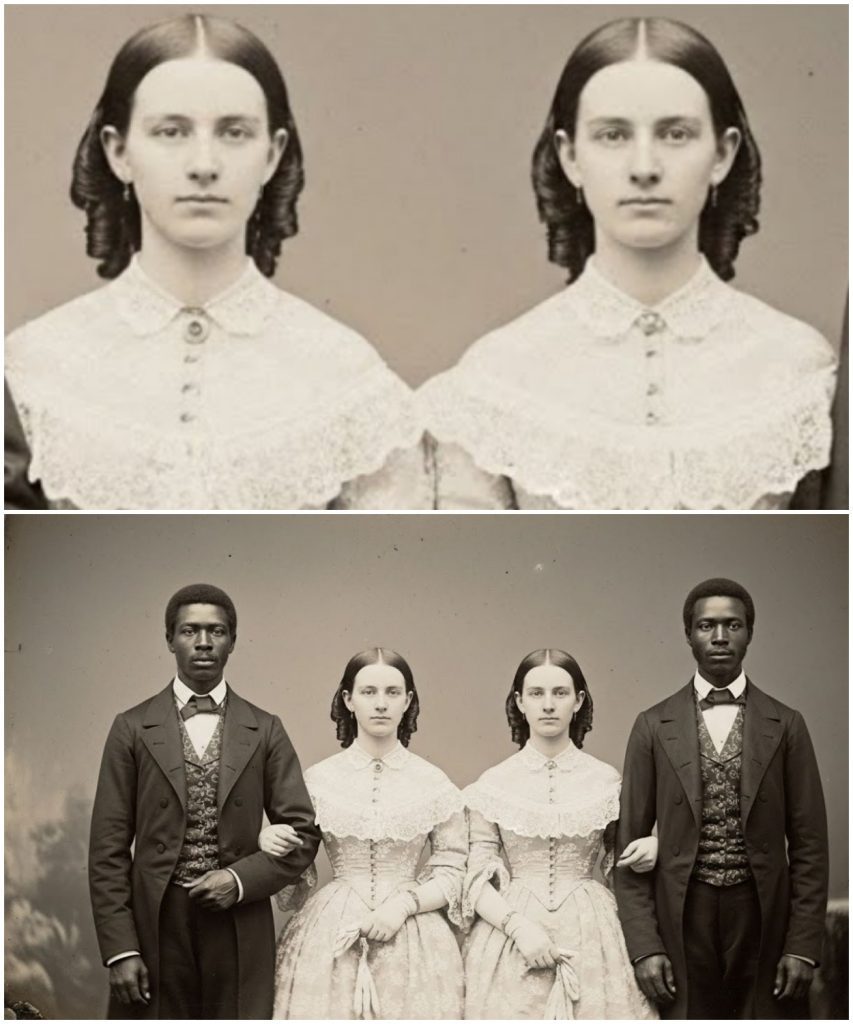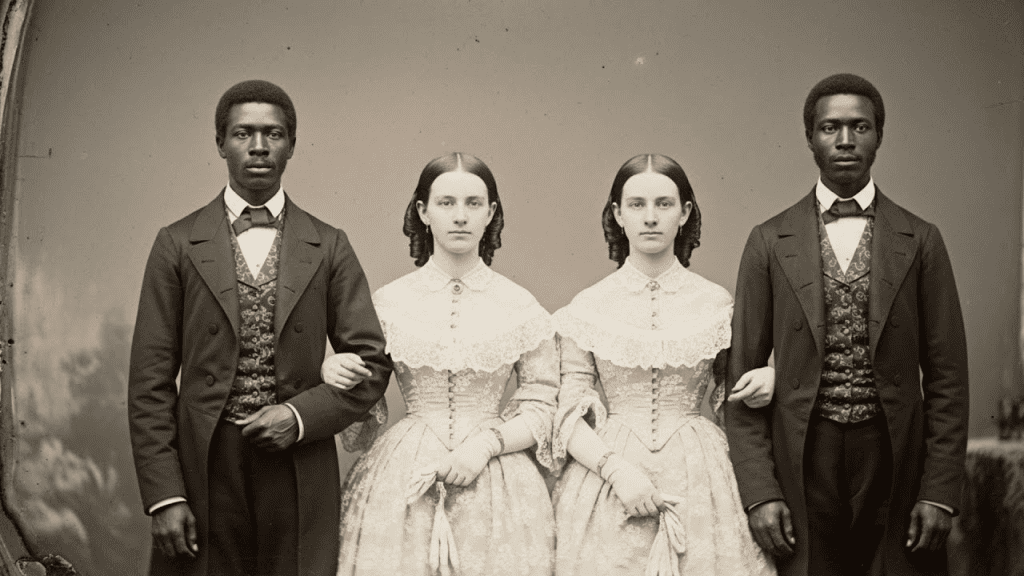The Forbidden Love That Shook Georgia’s Past
In the heart of the antebellum South, where laws bound hearts as tightly as chains, two sisters dared to love beyond the rules. The story of the Georgia twins who married their own enslaved men in 1847 is not just a tale of rebellion—it’s a testament to the unstoppable force of human love. Their courage defied one of the harshest societies in American history, revealing how compassion and loyalty can bloom even in the darkest soil.
A Glimpse into the 19th-Century South
To understand the magnitude of their choice, we must first step into their world. The 1840s South was built on hierarchy, power, and prejudice. Slavery was not just an institution—it was a belief system that shaped every aspect of life. Human beings were property, and love between a white woman and an enslaved man was not just taboo—it was dangerous.

Amid this world stood two young women born into privilege. The Georgia twins, whose names history has sadly forgotten, were daughters of a wealthy plantation family. They were expected to live within the strict boundaries of Southern womanhood—marry well, uphold appearances, and never question the moral weight of their world. But the heart, as history often shows, answers to no law.
Love Beyond Boundaries
Somewhere between the fields and the manor, affection grew. The twins found themselves drawn to two men enslaved by their family—men of strength, kindness, and quiet dignity. The connection was forbidden, but genuine love rarely asks permission.
In 1847, under the veil of secrecy, the twins made an unimaginable choice: they married the men society told them they could never love. The ceremony, simple and hidden, was an act of defiance as bold as it was dangerous. For these sisters, marriage was more than a union of hearts—it was a statement of equality, humanity, and hope.
Video : The Georgia Twins Who Married Their Own Enslaved Men: The Forbidden Pact of 1847
Defying a Cruel System
Their marriages were a private rebellion in a public world that offered no mercy. The twins risked everything—their reputations, their safety, even their inheritance. For their husbands, discovery could have meant imprisonment, torture, or death.
Yet they lived as partners, bound not by ownership but by choice. Behind closed doors, they built a secret world where love outshone power and where compassion triumphed over cruelty. But secrets are fragile things, especially in a society built on surveillance and control.
The Fallout and the Price of Freedom
When whispers of their relationships began to spread, the consequences were brutal. Their family faced humiliation, their community recoiled, and local authorities sought to make an example of them. Some records suggest that the twins were disowned, while others hint they fled the state under assumed names.
Their enslaved husbands, meanwhile, faced an uncertain fate. The law recognized no marriage between enslaved and free individuals—meaning their vows held no legal standing. Yet spiritually and emotionally, they were bound for life. Their act of devotion became a quiet protest against the very system that sought to destroy it.

A Love That Became Legend
Though historians lost track of their names, their story endured in Southern folklore—whispered among freed families, told around campfires, and recorded by abolitionists who viewed their defiance as a beacon of resistance. Their forbidden marriages became symbols of courage, empathy, and the enduring human capacity to love in the face of hate.
They challenged the false notion of racial superiority and reminded their world—and ours—that love is not confined by color, class, or circumstance. Their lives stood as proof that even in the darkest chapters of history, compassion can light a spark of change.
Why Their Story Still Matters Today
The tale of the Georgia twins isn’t just a historical curiosity—it’s a mirror reflecting ongoing struggles for equality and human dignity. Their defiance resonates in every fight for justice and inclusion today.
In choosing love, they questioned a system built on oppression. In secrecy, they created their own truth. And in silence, they spoke volumes about what it means to be human. Their courage echoes across time, reminding us that change often begins with those who dare to defy convention.
Video : The Plantation Lady Who Bred Slaves with Her Own Sons: Georgia’s Secret 1847
Conclusion: The Courage to Love Against All Odds
The Georgia twins who married their enslaved partners did more than defy society—they rewrote what love could mean in a world of cruelty. Their story stands as a rare and powerful reminder that true love is both revolutionary and redemptive.
Their names may be lost to time, but their spirit endures—etched in history as a quiet rebellion, a secret vow, and a timeless act of courage. It’s a love story not about fairy-tale endings, but about the kind of bravery that reshapes the world.
In the end, the twins proved something the world still needs to remember: love—real, fearless, unconditional love—has always been the greatest act of resistance.